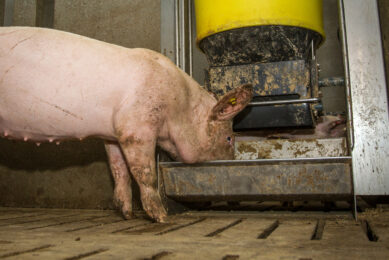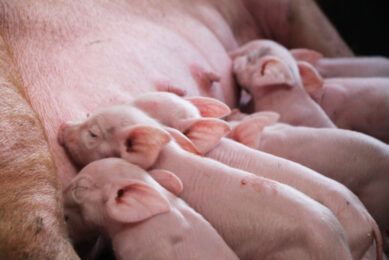Alternative protein sources head for across the ocean

With feed prices rising, everywhere around the world livestock producers are looking for alternative feed ingredients. Anticipating further growth, animal nutrition company Hamlet Protein opened its second production plant at the end of January, in Findlay, Ohio, USA.
It is a well-known story – margins on the animal nutrition market have become increasingly tight. Demand for both carbohydrate as well as protein sources has been increasing for many years, causing prices to be continuously high. Pig producers, whose major expenses lie in providing feed, are therefore always on the lookout to find more efficient ways of combining sources of energy and protein. Especially for younger production animals, it matters what kind of feed is fed during the days and weeks that matter most – just after weaning.
Hamlet Protein, founded in 1992 and headquartered in Horsens, Denmark, is one of many companies that have found their way into this market by introducing alternative, high-quality versions of protein for younger animals. The strategy around their highly digestible proteins for piglets is simple: It’s a touch more expensive upon purchase, but as a long-term investment it pays off with regard to feed conversion rates as well as animal health.
Not only in Europe, are messages like these appreciated, as in January 2012, the company opened its second production plant worldwide in Findlay, Ohio, United States. The 8,200 m2 facility was purchased from a company that could never take it into use due to the financial crisis. “We are very proud that we could buy and take it into use within a year,” says Søren Munch, CEO, Hamlet Protein.
Sources
Having done business with the American continent for some years, the company developed a solid customer base in the US, Canada and Mexico for its HP 300 brand in piglet weaner feeds. A base which is a lot closer due to the multi-million dollar plant, Munch explains, “Our customers will be all over the place around the factory. Providing them from the US will be more cost-efficient and we will be able to serve these markets at a shorter notice.” The supply chain, however, has also been significantly reduced, as soybeans and other raw materials can be found within a one-hour drive radius around the facility.
Having done business with the American continent for some years, the company developed a solid customer base in the US, Canada and Mexico for its HP 300 brand in piglet weaner feeds. A base which is a lot closer due to the multi-million dollar plant, Munch explains, “Our customers will be all over the place around the factory. Providing them from the US will be more cost-efficient and we will be able to serve these markets at a shorter notice.” The supply chain, however, has also been significantly reduced, as soybeans and other raw materials can be found within a one-hour drive radius around the facility.
With the jump across the ocean, the company anticipates a further growth in an apparently satiated swine market. Seeing chances for expansion, Munch says, “In the piglet feed business, the market for specially produced soy feeds is a fast-growing niche. It seems like the American market likes our value proposition: a better feed conversion ratio, a better feed efficiency and better animal health.”
Asia
Not only the American, Canadian and Mexican markets will be served from Ohio, as the plant will also play an active role in serving the growing markets in Asia. Munch says, “We experience high growth in Asia and will eventually be looking for an expansion in this geographical area as well. Our current first priority is an expansion of our new plant in Ohio in order to utilise the economies of scale in our facility and process.”
Not only the American, Canadian and Mexican markets will be served from Ohio, as the plant will also play an active role in serving the growing markets in Asia. Munch says, “We experience high growth in Asia and will eventually be looking for an expansion in this geographical area as well. Our current first priority is an expansion of our new plant in Ohio in order to utilise the economies of scale in our facility and process.”
The company’s bioconversion process reduces the level of antinutritional factors naturally present in soy to negligible levels. This enhances digestibility and allows full exploitation of the animal’s growth potential. The process is based on minimum energy consumption, no use of chemicals in the manufacturing process and a minimum of waste. The exact process is intellectual property, Munch says, “We like to keep production in our own hands. And it is impossible to do it for other parties as the production process is very specific.”
Last but not least – it’s not only piglet nutrition being a driver of the growth. A stronger demand for calf milk replacers as well as products for the broiler business, the pet food industry and aquaculture industry could be observed.











